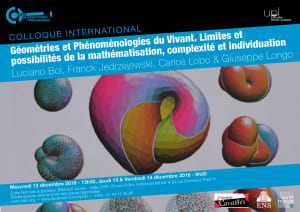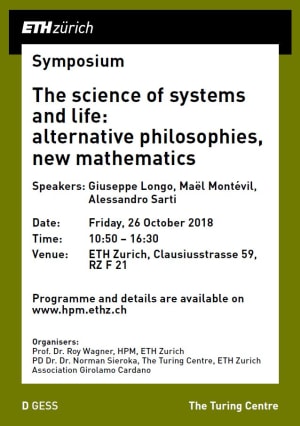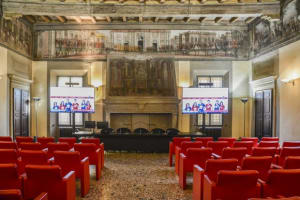
Talks of 2018 in english
-

-

What is a new possibility in theoretical biology?
Biological evolution involves the appearance of new traits, new phenotypes and new processes but the mathematical understanding of such novelties is still lacking. In this paper, I argue that the notion of a new possibility should be and can be a fundamental notion in biology. This idea has been used in several models but it still lacks a proper mathematical, theoretical and epistemological framework. The notion of new possibility should be analyzed carefully since, like for the notion of probability, points of view a priori and a posteriori cannot be conflated. Moreover possibilities are virtual and it seems at first sight that adding possibilities by a retrospective theoretical move does not change the state of an object. In order to define precisely the notion of new possibilities, I will first discuss a positive notion of possibility which pertains to properties that are properly defined theoretically. This will lead us to a more precise discussion than the set-theoretic language to describe possibilities and enable us to define a robust notion of new possibilities.
-

Symposium: The science of systems and life: Alternative philosophies, new mathematics
We are a group of mathematicians who denounce a mathematization of the world oriented towards purely quantitative analyses and reductionism, rather than invention and construction of understanding. The prevailing use of mathematics as a search for “optimal paths” in economy, biology and general human activities supposes a pre-given universe of possibilities and is suitable for control more than for knowledge construction and a common action. Sometimes, researchers even claim that “computer programs” run organisms’ development and animal or human behavior.
We are instead interested in the historical emergence of meaning in changing spaces of possibilities as well as in the production of sense in science and in the personal activity of the researcher. Our current work focuses on historicity, organicity and contextuality of life; on the role of interpretation and meaning in the process of vision; on the importance of interpretation in the applications of mathematics and of a committed analysis of future projections in areas such as finance and ecology.
In 2017, we proposed the creation of the association Girolamo Cardano (1501- 1576: inventor of imaginary numbers, first thinker of the transformation of the living in time) that readers are invited to join: http://cardano.visions- des-sciences.eu -

The coding of life. Breakthroughs and blind spots in the mathematisation of the life sciences.
-

Secrecy, transparency and opacity in biology.
In biology, the molecular biology revolution lead to the prevalence of a linguistic metaphor in the second half of the twentieth century. This metaphor led to a double perspective on secrecy: biologists aimed to unravel the secrets of the living, which would be revealed by reading and decoding DNA, and the secrecy between researchers competing to decode the same "information". This framework is now outdated, both for the understanding of life and in social practice. Biology seems to hesitate between imposing transparency, on both its practices and its objects, and recognizing the existence of several opacities.
-

Round table: Mathematics, life sciences, finance, work and economy
Nicholas Georgescu Rœgen and René Passet, as well as MIT, have emphasized that entropy and negentropy should be central to economic analysis. We will see that this requires us to consider anti-entropy as a dynamic factor, and to specify its role in a contributive economy, according to biology.
-

Entropy and the anthropocene
-
What first principles for mathematical modeling in biology?
By analogy with theoretical physics, theoretical biology is not limited to mathematical modeling. Instead, theoretical biology should strive to find suitable first principles to ground the understanding of biological phenomena and ultimately frame biological experiments and mathematical models. First principles in physics are discussed in terms of symmetries and the associated conservation principles, on the one side, and optimization on the other side.
In biology, we have argued instead that a strong notion of variation is fundamental. This notion encompasses new possibilities and is associated with the historicity of biological phenomena [3]. By contrast, the relative regularity of some aspects of biological organisms should be seen as the consequence of a mutual stabilization by the parts of organisms [2].
In this paper, we will focus on a last aspect which pertains to the way cellular behavior is framed theoretically: should cells of multicellular organisms be considered as spontaneously quiescent so that a stimulation would be required for them to move or proliferate, or should cells be considered as spontaneously moving and proliferating so that quiescence would be the result of constraints. We argue the latter and will show that this assumption can be used to build a model of epithelial morphogenesis in tissue culture.



